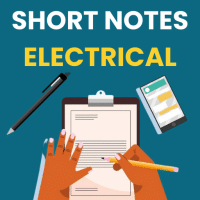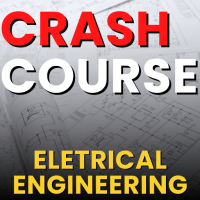Electrical Engineering (EE) Exam > Electrical Engineering (EE) Questions > Which of the following is not a kind of relay...
Start Learning for Free
Which of the following is not a kind of relay on the basis of constructional features?
- a)Moving iron type
- b)Static
- c)Induction
- d)Current
Correct answer is option 'D'. Can you explain this answer?
Verified Answer
Which of the following is not a kind of relay on the basis of construc...
According to the principle of operation and construction, the relay may be classified as follows
1) Electromagnetic Relays
2) Electromagnetic Induction Relays
3) Electrodynamic Type Relays
4) Moving Coil Type Relays
5) Electro-thermal Relays
6) Static Relays
Most Upvoted Answer
Which of the following is not a kind of relay on the basis of construc...
Introduction:
In electrical engineering, relays are widely used devices that control electrical circuits by opening and closing contacts electromechanically or electronically. They are classified based on various factors, including their constructional features. This question is asking us to identify the type of relay that is not based on constructional features.
Moving Iron Type Relay:
- Moving iron type relays have a movable iron armature and a fixed coil.
- The armature moves when the coil is energized, and this movement is used to open or close the contacts of the relay.
- These relays are commonly used for AC circuits and are suitable for both high and low currents.
Static Relay:
- Static relays do not have any moving parts.
- They use solid-state components such as transistors, diodes, and operational amplifiers to perform the relay function.
- Static relays are faster, more reliable, and have a longer lifespan compared to electromechanical relays.
- They are commonly used in applications where high-speed operation, precise control, and immunity to mechanical wear and tear are required.
Induction Relay:
- Induction relays use the principle of electromagnetic induction to operate.
- They consist of a coil and an iron core that create a magnetic field when energized.
- The magnetic field induces eddy currents in a conducting disc or a cup-shaped rotor, causing it to move and operate the relay contacts.
- Induction relays are commonly used in protective relaying applications, such as overcurrent and distance relays.
Current Relay:
- Current relay is not a specific type of relay based on constructional features.
- It is a generic term used to describe relays that operate based on the magnitude of current flowing through them.
- Current relays can be of various types, such as overcurrent relays, undercurrent relays, differential relays, etc.
- The constructional features of a current relay can vary depending on its specific application and design.
Conclusion:
Based on the above discussion, the correct answer is option 'D' - Current. Current relay is not a specific type of relay based on constructional features, but rather a general term used to describe relays that operate based on current magnitude. The other options, moving iron type relay, static relay, and induction relay, are all specific types of relays based on their constructional features.
In electrical engineering, relays are widely used devices that control electrical circuits by opening and closing contacts electromechanically or electronically. They are classified based on various factors, including their constructional features. This question is asking us to identify the type of relay that is not based on constructional features.
Moving Iron Type Relay:
- Moving iron type relays have a movable iron armature and a fixed coil.
- The armature moves when the coil is energized, and this movement is used to open or close the contacts of the relay.
- These relays are commonly used for AC circuits and are suitable for both high and low currents.
Static Relay:
- Static relays do not have any moving parts.
- They use solid-state components such as transistors, diodes, and operational amplifiers to perform the relay function.
- Static relays are faster, more reliable, and have a longer lifespan compared to electromechanical relays.
- They are commonly used in applications where high-speed operation, precise control, and immunity to mechanical wear and tear are required.
Induction Relay:
- Induction relays use the principle of electromagnetic induction to operate.
- They consist of a coil and an iron core that create a magnetic field when energized.
- The magnetic field induces eddy currents in a conducting disc or a cup-shaped rotor, causing it to move and operate the relay contacts.
- Induction relays are commonly used in protective relaying applications, such as overcurrent and distance relays.
Current Relay:
- Current relay is not a specific type of relay based on constructional features.
- It is a generic term used to describe relays that operate based on the magnitude of current flowing through them.
- Current relays can be of various types, such as overcurrent relays, undercurrent relays, differential relays, etc.
- The constructional features of a current relay can vary depending on its specific application and design.
Conclusion:
Based on the above discussion, the correct answer is option 'D' - Current. Current relay is not a specific type of relay based on constructional features, but rather a general term used to describe relays that operate based on current magnitude. The other options, moving iron type relay, static relay, and induction relay, are all specific types of relays based on their constructional features.

|
Explore Courses for Electrical Engineering (EE) exam
|

|
Question Description
Which of the following is not a kind of relay on the basis of constructional features?a)Moving iron typeb)Staticc)Inductiond)CurrentCorrect answer is option 'D'. Can you explain this answer? for Electrical Engineering (EE) 2025 is part of Electrical Engineering (EE) preparation. The Question and answers have been prepared according to the Electrical Engineering (EE) exam syllabus. Information about Which of the following is not a kind of relay on the basis of constructional features?a)Moving iron typeb)Staticc)Inductiond)CurrentCorrect answer is option 'D'. Can you explain this answer? covers all topics & solutions for Electrical Engineering (EE) 2025 Exam. Find important definitions, questions, meanings, examples, exercises and tests below for Which of the following is not a kind of relay on the basis of constructional features?a)Moving iron typeb)Staticc)Inductiond)CurrentCorrect answer is option 'D'. Can you explain this answer?.
Which of the following is not a kind of relay on the basis of constructional features?a)Moving iron typeb)Staticc)Inductiond)CurrentCorrect answer is option 'D'. Can you explain this answer? for Electrical Engineering (EE) 2025 is part of Electrical Engineering (EE) preparation. The Question and answers have been prepared according to the Electrical Engineering (EE) exam syllabus. Information about Which of the following is not a kind of relay on the basis of constructional features?a)Moving iron typeb)Staticc)Inductiond)CurrentCorrect answer is option 'D'. Can you explain this answer? covers all topics & solutions for Electrical Engineering (EE) 2025 Exam. Find important definitions, questions, meanings, examples, exercises and tests below for Which of the following is not a kind of relay on the basis of constructional features?a)Moving iron typeb)Staticc)Inductiond)CurrentCorrect answer is option 'D'. Can you explain this answer?.
Solutions for Which of the following is not a kind of relay on the basis of constructional features?a)Moving iron typeb)Staticc)Inductiond)CurrentCorrect answer is option 'D'. Can you explain this answer? in English & in Hindi are available as part of our courses for Electrical Engineering (EE).
Download more important topics, notes, lectures and mock test series for Electrical Engineering (EE) Exam by signing up for free.
Here you can find the meaning of Which of the following is not a kind of relay on the basis of constructional features?a)Moving iron typeb)Staticc)Inductiond)CurrentCorrect answer is option 'D'. Can you explain this answer? defined & explained in the simplest way possible. Besides giving the explanation of
Which of the following is not a kind of relay on the basis of constructional features?a)Moving iron typeb)Staticc)Inductiond)CurrentCorrect answer is option 'D'. Can you explain this answer?, a detailed solution for Which of the following is not a kind of relay on the basis of constructional features?a)Moving iron typeb)Staticc)Inductiond)CurrentCorrect answer is option 'D'. Can you explain this answer? has been provided alongside types of Which of the following is not a kind of relay on the basis of constructional features?a)Moving iron typeb)Staticc)Inductiond)CurrentCorrect answer is option 'D'. Can you explain this answer? theory, EduRev gives you an
ample number of questions to practice Which of the following is not a kind of relay on the basis of constructional features?a)Moving iron typeb)Staticc)Inductiond)CurrentCorrect answer is option 'D'. Can you explain this answer? tests, examples and also practice Electrical Engineering (EE) tests.

|
Explore Courses for Electrical Engineering (EE) exam
|

|
Signup for Free!
Signup to see your scores go up within 7 days! Learn & Practice with 1000+ FREE Notes, Videos & Tests.


















